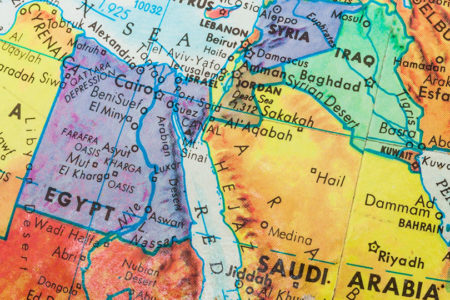Is Everybody Happy? Don’t Count on It!
When the Sharm Agreement was signed at Sharm El-Sheik, Egypt, last month, a mini-eruption of euphoria flowed into statehouses and liberal editorial offices all over the world. At long last, the spin was, we are on the road to a true era of peace, love, and downright neighborliness in the Middle East. Yasser Arafat got more land, the release of some very bad guys from Israeli jails, and the promise of still more to come. World leaders, ever eager to step up to the negotiating table and sign such agreements, no doubt had visions of Nobel Peace Prizes dancing in their heads. For little Israel, however, Sharm meant signing over still more tracts of land in exchange for paper promises that already exist in such profusion the walls of the Knesset could be papered with them. The important points of the Sharm Agreement tell the story:
- Israel will relinquish another 11 percent of Judea and Samaria (the West Bank) to Palestinian control over the next five months, giving the Palestinian Authority complete or partial control of 42 percent of the territory.
- Israel will release 350 prisoners—200 after the signing and another 150 in October.
- Israel will guarantee safe-passage corridors through Israeli territory for Palestinians between Gaza and the West Bank.
- Both sides will establish a framework for final peace talks by February 15, 2000, with a goal of signing a permanent accord by September 2000.
- The Palestinians get the go-ahead to build their seaport in Gaza.
- The Palestinians promise to implement security commitments, which include collecting illegal weapons, arresting and detaining Palestinian fugitives, and providing Israel with the names of all Palestinian Police.
Perhaps some degree of optimism could be entertained if all parties intended to keep their promises. However, based on past performances, we can be virtually certain that this will not be the case. History tells us that Israel gives land and risks security in deals with people who will never be happy until they have it all. This is not doomsday rhetoric. Islamic militants, led by Yasser Arafat, tell the world this very thing at every opportunity. They make their intentions abundantly clear.
Events immediately following the signing illustrate just how unhappy some of the beneficiaries of Israel’s generosity are. Before the ink was dry on the heralded document, Islamic terrorists went to work. They were not the most proficient transporters of death and destruction, to be sure. Three would-be killers blew themselves up while driving cars loaded with explosives meant for Israeli citizens. In Cairo, a knife-wielding fanatic slashed Egyptian President Hosni Mubarak in a failed assassination attempt. The attack was a chilling reminder of the price the late Egyptian President Anwar Sadat paid for extending his hand in peace to Israel.
In an address to the Knesset Foreign Affairs and Defense Committee, Major-General Amos Malka, who is head of Israeli Military Intelligence, told the committee that Iran is encouraging Hamas, the Islamic Jihad, and Hizbullah to carry out more attacks. Malka said the terrorist groups are aiming for “strategic attacks” of such magnitude that they could bring the peace process to a halt. The general’s report should give pause even to the most militant peaceniks in Israel and the Western World—but don’t count on it.
When all is said and done, peace will not come through negotiations between national leaders. They may draw boundaries, build access roads, and dredge harbors, but they will not make peace. Israeli Prime Minister Ehud Barak, Yasser Arafat, and Bill Clinton are actually minor players in this drama. The key to peace, albeit temporary, lies squarely in the hands of the Palestinian people. They can have peace. The question is, How badly do they want it? Israel is not an expansionist state. What other nation in the civilized world would be willing to repeatedly negotiate the return of lands captured in war from countries that were trying to wipe it off the face of the earth?
It is long past the time for the Palestinian people to say No to tyrants who have used them as pawns in their manic, Jihad-driven obsession to kill Jews and destroy what they cannot deny. Israel is a reality that will not go away. Palestinians, on the other hand, need jobs. Their children need a decent future. They need to awaken without fear of hearing that one of their neighbors has just brought the wrath of a nation down on their heads by splattering the walls of some town with the shredded remains of himself and his victims.
Those of us who travel frequently in that region of the world know that the vast majority of Palestinians are courteous, helpful, and genuinely friendly people. For decades most of them have lived and worked in peace beside their Israeli neighbors. Their future belongs in their hands and those of their children, not in the hands of scowling mullahs in Tehran or tyrants who think everything of themselves and nothing of the people they are causing to suffer.






